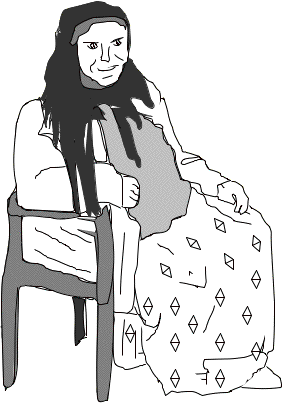Translations:
Other Pages:
Key Words
Modules
Sociology:
Home Page
Lecture Notes
Discussions
Hub
Utilities:
Site Map
Contact
Utility Documents
Useful Links
WHAT ABOUT THE ELDERS?
Respect is a cultural variable
by Phil Bartle, PhD
Training Handout
What factors contribute to the variations?
If you have had experience with several societies, you might easily notice that elders tend to be treated with much more respect in most of them than they are in mainstream Western societies.
Rather then rejoice or deplore that fact, ask what are the social differences which may account for those variations?
Is it merely a question of the romanticizing of youth in modern media?
Most older persons have accumulated much information, even wisdom.
Their physical stamina is usually lower than for younger people, and their ability to learn new techniques and technologies rather hindered.
(Memory? Now what did I eat for breakfast today?)
You can think of many more characteristics commonly attributed to older individuals.
If you look at many of the features which distinguish older people from younger people, their value is lower in industrial and post industrial societies and higher in agrarian and trading societies and communities.
In the first, the ability to learn new technologies is useful because social and technological change is faster.
In the second, accumulated wisdom retains its use because agrarian and trading communities change more slowly.
In gathering and hunting societies, their knowledge of where the resources are to be found in nature, and the methods of making things –– including traditional hand made artefacts –– are both useful and appreciated.
Even in town today, where you find a family grocery store, grandma and/or grandpa can help out and run the till or do other useful tasks Not so in other industries.
The value that older people have, which varies where the technology varies, may be an important factor to consider when comparing degrees of respect.
In western societies a common practice is to put seniors into special seniors' homes where they can be cared for by professionals while their busy family members can go on with their lives, and perhaps feel less guilty about not looking after them.
Many such residences try to provide an illusion of gemeinschaft, but because they are bureaucracies and often requiring to show a profit, that is often only an illusion.
Governmental regulations, especially about hygiene and safety, in seniors homes hinder the spontaneity of community life.
Staff have definite tasks to complete so as to keep their jobs, and do not have time or inclination to take time for side tracks and diversions.
Pets, especially the big joyful slobbering dog, are often prohibited.
Children are scarce, usually well behaved and kept on short leashes by the parents.
As one resident once sighed, “We just come to the lobby after breakfast and stare at each other, waiting for them to die.” Bartle 2005 p.9:4<
Canadian mainstream society is informed by the values of capitalism and corporate culture.
They preach selfishness and greed.
Spin doctors sometimes call these "the profit motive."
Over concern for one's own well being detracts from respect and concern from the well being of others, including elders.
In many agrarian (farming) and mercantile (trading) societies, the elders would be an intrinsic part of the family as a productive unit.
Capitalist society does not require the family to be the productive unit (as factories became the main units of production).
When a family engaged in running a shop, even if the elders were physically weak, they could keep the accounts or run the till. They were useful Not so in capitalist society.
Similarly among farming families, although elders did not have the physical strength or stamina, their accumulated wisdom and mental skills kept them useful, and this contributed to the respect they enjoyed.
In capitalist society, with automation and mechanization, only the most productive remain employed, and that further pushes seniors out of work.
In Canadian mainstream society, the common practice is for our seniors to live in specialized residences that are designed to care for their needs.
There is a lot of guilt on the part of their children who think to a time in our own history when seniors were cared for by their children at home.
Our busy pace of life is often used as a rationale (excuse) for packing them off to a seniors’ home, where they may practice their dementia and confusion under the watchful eyes of professionals.
The industrial revolution and capitalist economy required social and geographical mobility.
This contributed to the erosion of the extended family Workers moved but could not bring their elderly parents, so they often abandoned them.
It is important to note that many family characteristics are not merely the result of internal family dynamics, but are caused by and reflect the wider technological, economic and political characteristics of changing societies.
Solutions to the problem are many.
Mixed communities allow people of all ages to live together ("elders" as a category is a social construct; in reality we all age one day at a time in a continuum).
Flexible working hours and availability of part time work will allow people to remain productive as they grow older.
Removing forced retirement as a specific age (eg 65) will allow seniors opportunity to work longer.
Creating meaningful community service positions and programmes that will allow seniors to participate will also help.
Reference Cited: Bartle, P (2005) The Sociology of Communities; An Introduction. Camosun Imaging. Victoria
See: Senior Citizens in Kwahu Tafo, Photos by Prof. Sjaak van der Geest. Click on Portrait Gallery
––»«––
Old Woman; Eastern Europe Ambiance;
Illustration by Allison Miller:

|